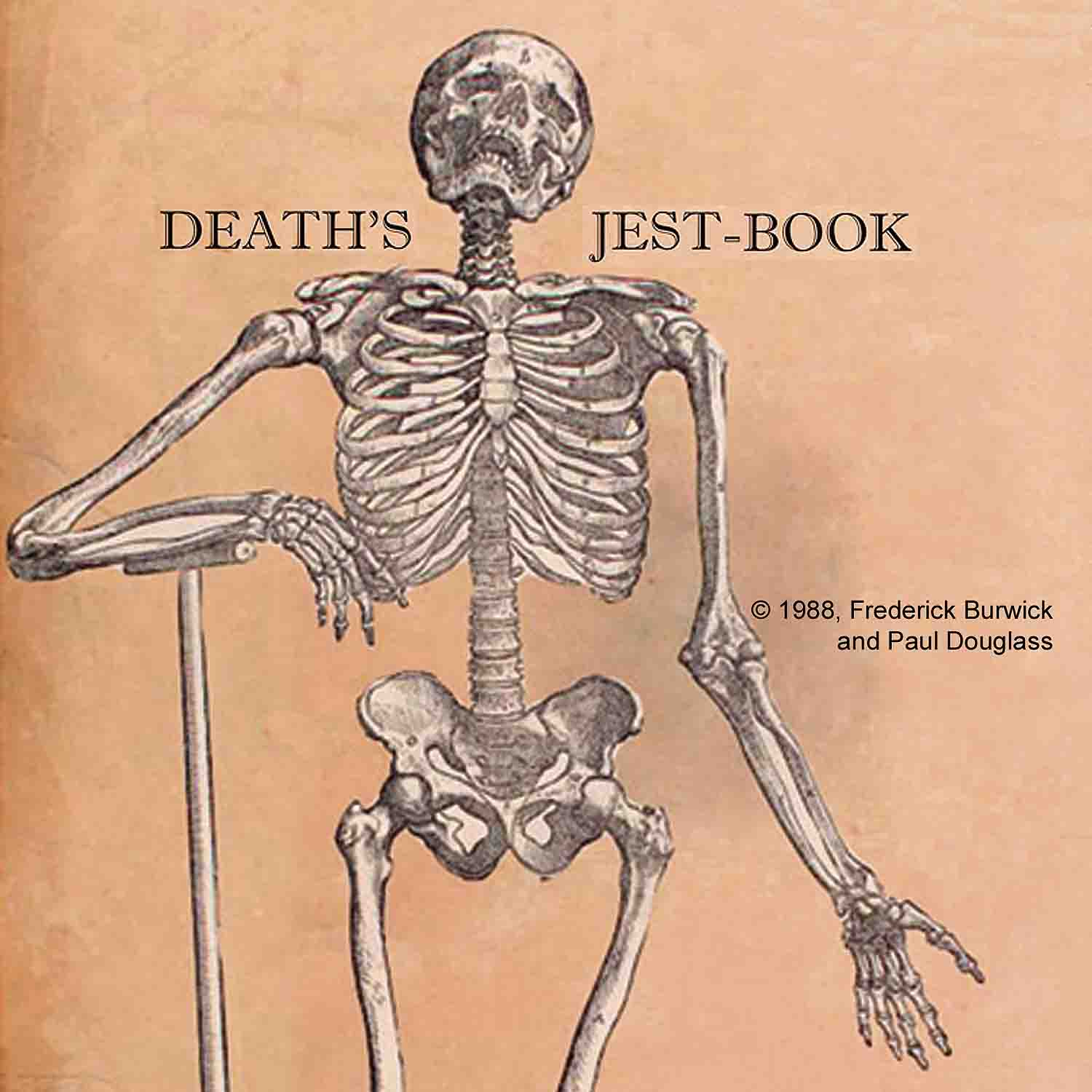Death's Jest-Book
Thomas Lovell Beddoes

Thomas Lovell Beddoes began Death’s Jest Book when he was a 22-year-old student who had left Oxford to continue his medical studies in Germany . When the play was rejected by his best friends, he fell into a bout of drinking and depression that ultimately resulted in his being expelled from Goettingen University . But he abandoned neither the play nor his studies. He went on to complete his MD degree at Wuerzburg, and he spent the remaining years of his life, until his ultimate suicide, adding songs and scenes to his play. The themes were immediately tied to his tormented homosexuality, and to the experience that taught him that all expressions of desire were taboo and must be repressed or hidden. Beddoes was preoccupied with death, decay, and dissolution. His morbid fascination with mortality was expressed with satirical irony, ridicule of the futile idealization of physical beauty, coarse jesting on bodily functions, dissected corpses, aborted babies. Relations between men, no less than between men and women, are disrupted by rivalry and jealousy. Lovers love in vain: the only consummation is in the grave. Dramatic moments of grief lapse inevitably into mocking fatalism. One by one, each of the characters is murdered, yet each refuses an inanimate death. They continue to play. Death’s Jest Book, originally sub-titled “The Fool’s Tragedy,” depicts the social tragedy of repressive homophobia, but turns into grotesque comedy played out in the “underground” of the tombs.
Its themes an embarrassment to many readers, the play has been kept from the stage throughout the past two centuries. This premier performance stars Zachary Gallagher in the role of the guilty and haunted Duke Melveric; Stephen Pu as Wolfram, the friend whom he murders in jealous rage; William Bibbiani as Mandrake, dabbler in the occult; A. J. Rodriguez as Ziba, practitioner of black arts; Greg Cragg, as Torwald, the Duke’s Minister; Holley Replogle as the Sibylla, rescued from captivity only to die in grief; Rebecca Wyrostek as Kate, a winsome tavern wench subjected to groping and drunken lechery; a dance troupe directed by Francine Maigue, and a chorus directed by Holley Replogle. The amazing original musical score for this production was composed by Brian Holmes, international horn expert, composer and conductor, and a faculty member at San Jose State University . Daniel Zimani plays the poet, Beddoes, and Tom Wheatley appears in the title role as Death. Selections Include:
Album Art: Download PDF
Songs :
1. Mandrake’s Song (“Folly hath now turned out of door”) Play/Download Song (2.5 mb)
2. Kate and Chorus: Song from the Ship (“To sea, to sea”) Play/Download Song (2.6 mb)
3. Sibylla: Song from the Waters (“The swallow leaves her nest”) Play/Download Song (2.5 mb)
4. Wolfram and Sibylla: The Phantom Wooer (“A ghost, that loved a lady fair”) Play/Download Song (4.6 mb)
5. Mandrake: Wolfram’s Dirge (“If thou wilt ease thine heart”) Play/Download Song (2.8 mb)
6. Mandrake and Kate: The New Cecilia (“Whoever has heard of St. Gingo”) Play/Download Song (5.7 mb)
7. Beddoes: The New Dodo (“Squats on a toadstool”) Play/Download Song (8.8 mb)
8. Entr’acte: Sibylla: Dream-Pedlary Play/Download Song (3.0 mb)
9. Kate and Chorus: Song in the Air (“The moon doth mock”) Play/Download Song (3.7 mb)
10. Chorus: Song of the Deaths (“Mummies and skeletons”) Play/Download Song (7.8 mb)
11. Wolfram, Melveric, Beddoes: Drinking Song (“My goblet’s golden lips”) Play/Download Song (3.8 mb)
12. Wolfram’s Song (“Old Adam, the carrion crow”) Play/Download Song (4.1 mb)
13. Wolfram, Sibylla, and Chorus (“We do lie beneath the grass”) Play/Download Song (4.7 mb)
14. Mandrake’s Song (“Folly hath now turned out of door”) Play/Download Song (2.6 mb)
This not-for-profit site is intended to make vocal music and lyrics of the of the early 19th century in the British Isles, Europe, Canada, the United States, and Australia more accessible. It includes contemporary music of the period and later settings (e.g., Brian Holmes's complete score for Death's Jest Book and Lori Lange's settings of Byron lyrics). For further information, contact Paul.Douglass@sjsu.edu